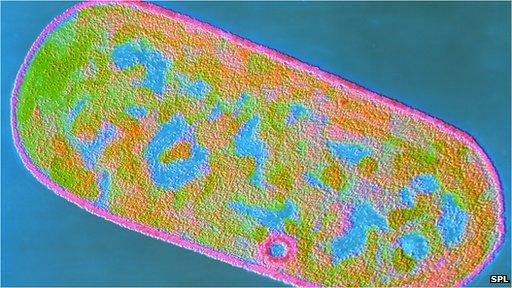Multiple sclerosis 'linked to food bug'
- Published

Some strains of clostridium secrete toxins
A food poisoning bacterium may be implicated in MS, say US researchers.
Lab tests in mice by the team from Weill Cornell Medical College revealed a toxin made by a rare strain of Clostridium perfringens caused MS-like damage in the brain.
And earlier work by the same team, published in PLoS ONE, external, identified the toxin-producing strain of C. perfringens in a young woman with MS.
But experts urge caution, saying more work is needed to explore the link.
No-one knows the exact cause of Multiple sclerosis (MS), but it is likely that a mixture of genetic and environmental factors play a role. It's a neurological condition which affects around 100,000 people in the UK.
Bacteria
C. perfringens, found in soil and contaminated undercooked meat, comes in different strains.
Most cases of human infection occur as food poisoning - diarrhoea and stomach cramps that usually resolve within a day or so. More rarely, the bacterium can cause gas gangrene.
And a particular strain of C. perfringens, Type B, which the Weill team says it identified in a human for the first time, makes a toxin that can travel through blood to the brain.
In their lab studies on rodents the researchers found that the toxin, called epsilon, crossed the blood-brain barrier and killed myelin-producing cells - the typical damage seen in MS.
Lead investigator Jennifer Linden said the findings are important because if it can be confirmed that epsilon toxin is a trigger of MS, a vaccine or antibody against the toxin might be able to halt or prevent this debilitating disease.
She presented the group's latest findings at a meeting of the American Society for Microbiology, external.
Dr Susan Kohlhaas, Head of Biomedical Research at the MS Society, said: "Discovering potential causes or triggers for MS could enable us to develop better treatments or even, one day, prevent the condition. This is interesting research but the findings now need to be validated in larger studies to establish if this toxin really is a potential trigger for MS."
- Published5 December 2013
- Published26 September 2013